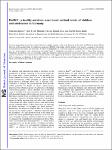HuSKY: a healthy nutrition score based on food intake of children and adolescents in Germany
Kleiser, Christina
Mensink, Gert
Scheidt-Nave, Christa
Kurth, Bärbel-Maria
For many epidemiological questions an overall indicator of healthy nutrition can be useful. Based on the data from the FFQ of the German Health Interview and Examination Study for children and adolescents (KiGGS) we developed a healthy nutrition score based on a comparison with current recommendations for children and adolescents. We observed independent and statistically significant relationships between the nutrition score and age, sex, socio-economic status, immigration background, level of urbanisation and residence in former East v. former West Germany. Furthermore, the nutrition score was statistically significantly related to serum concentrations of homocysteine (inverse association) and folate (positive associations). The construction of a healthy nutrition score appears to be useful for several reasons. For instance, our score can be used to summarise an abundance of dietary information to a single measure, to get an overall impression of diets of individuals or groups, which can be useful to detect certain risk groups.
No license information

